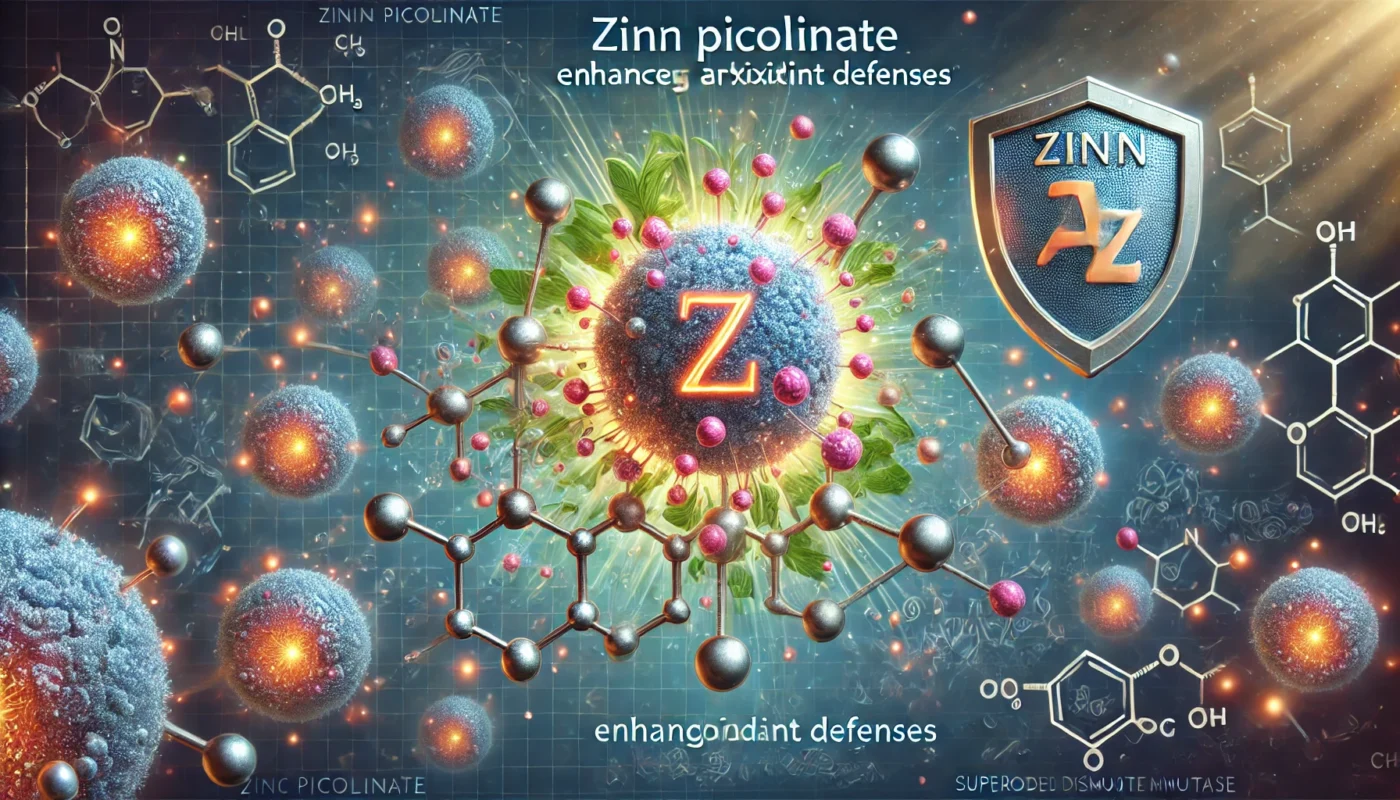Gestational diabetes mellitus (GDM) is a condition that affects up to 10% of pregnancies worldwide. Characterized by glucose intolerance and elevated blood sugar levels during pregnancy, GDM poses significant risks to both the mother and baby, including increased likelihood of type 2 diabetes, preeclampsia, and complications during delivery. For the baby, GDM can lead to excessive birth weight, respiratory distress, and metabolic imbalances.
Zinc Picolinate for Preventing Gestational Diabetes: The Science You Need to Know is an original (HSLHealing) article.
Effective management of blood sugar levels is crucial for preventing and mitigating the risks of GDM. While dietary adjustments and exercise are standard recommendations, research increasingly highlights the role of key micronutrients like zinc in regulating blood sugar and supporting insulin function. Zinc picolinate, a highly bioavailable form of zinc, offers targeted benefits for promoting healthy blood sugar levels during pregnancy. This article explores how zinc picolinate can help prevent gestational diabetes, supported by scientific evidence and clinical insights.
You May Also Like:
Zinc Picolinate for Liver Detoxification: Clearing Toxins Naturally
Zinc Picolinate for Hormone Detoxification: Supporting Balance and Natural Cleansing
Understanding Gestational Diabetes
Gestational diabetes develops when hormonal changes during pregnancy interfere with the body’s ability to regulate blood sugar levels effectively. The placenta produces hormones that can lead to insulin resistance, forcing the pancreas to work harder to produce insulin. When the pancreas cannot meet the increased demand, blood sugar levels rise, resulting in GDM.
Risk Factors for GDM:
- Overweight or Obesity: Higher body mass index (BMI) increases the risk of insulin resistance.
- Age: Pregnant individuals over 25 years old are at higher risk.
- Family History: A family history of diabetes raises the likelihood of GDM.
- Previous GDM Diagnosis: Having GDM in a previous pregnancy increases the risk of recurrence.
- Nutrient Deficiencies: Micronutrient imbalances, including low zinc levels, are linked to higher GDM risk.
Statistics:
- According to the International Diabetes Federation, GDM affects approximately 15 million pregnancies annually.
- Women with GDM have a 7-fold increased risk of developing type 2 diabetes later in life.

The Role of Zinc in Blood Sugar Regulation
Zinc is an essential trace mineral that plays a critical role in glucose metabolism, insulin production, and overall endocrine function. Its specific roles in blood sugar regulation include:
- Insulin Synthesis and Secretion:
Zinc is necessary for insulin production in the pancreas and its proper storage in beta cells. - Improving Insulin Sensitivity:
Zinc enhances the insulin receptor’s ability to bind insulin, improving cellular glucose uptake. - Antioxidant Protection:
Zinc supports antioxidant enzymes like superoxide dismutase (SOD), reducing oxidative stress that can impair insulin function. - Reducing Inflammation:
Zinc modulates inflammatory cytokines, lowering systemic inflammation that contributes to insulin resistance. - Regulating Appetite and Glucose Homeostasis:
Zinc influences hormones like leptin and ghrelin, which help regulate appetite and glucose levels.

What Is Zinc Picolinate?
Zinc picolinate is a chelated form of zinc, where zinc is bound to picolinic acid. This form enhances absorption in the gastrointestinal tract, making it one of the most bioavailable zinc supplements. For pregnant individuals, zinc picolinate provides a reliable way to ensure adequate zinc levels, supporting healthy blood sugar regulation and reducing the risk of GDM.
How Zinc Picolinate Helps Prevent Gestational Diabetes
1. Supporting Insulin Function
Zinc is integral to the synthesis, storage, and secretion of insulin. Zinc picolinate ensures sufficient zinc levels, helping the pancreas meet the increased insulin demands of pregnancy.
- Study Insight: Research in Diabetes Care found that zinc supplementation improved insulin sensitivity by 24% in individuals with impaired glucose tolerance, highlighting its potential to prevent GDM.
2. Enhancing Insulin Sensitivity
Insulin resistance is a hallmark of gestational diabetes. Zinc picolinate improves the body’s response to insulin, facilitating better glucose uptake by cells.
- Clinical Evidence: A study in Journal of Trace Elements in Medicine and Biology reported that zinc supplementation reduced fasting blood glucose levels by 15% and improved insulin sensitivity in pregnant individuals at risk of GDM.
3. Reducing Oxidative Stress
Pregnancy increases oxidative stress, which can impair insulin function and damage pancreatic beta cells. Zinc picolinate enhances antioxidant defenses, protecting against these effects.
- Research Finding: A study in Free Radical Biology and Medicine demonstrated that zinc supplementation increased antioxidant enzyme activity by 35%, reducing oxidative stress in pregnant individuals.
4. Modulating Inflammation
Chronic low-grade inflammation is a contributing factor to insulin resistance. Zinc picolinate regulates inflammatory pathways, reducing levels of pro-inflammatory cytokines.
- Evidence: Research in Nutrients showed that zinc supplementation reduced markers of inflammation, such as interleukin-6 (IL-6) and tumor necrosis factor-alpha (TNF-α), by 20% in pregnant individuals.
5. Supporting Fetal Development
Zinc plays a vital role in the growth and development of the fetus, including proper endocrine function. Zinc picolinate ensures that both mother and baby have adequate zinc levels for optimal health.
- Study Insight: A clinical trial in American Journal of Clinical Nutrition found that zinc supplementation reduced the risk of complications, including GDM, by supporting maternal and fetal zinc levels.
6. Reducing Risk Factors for GDM
By improving insulin sensitivity, reducing inflammation, and supporting antioxidant defenses, zinc picolinate addresses multiple pathways that contribute to gestational diabetes.
- Clinical Evidence: A meta-analysis in Journal of Obstetrics and Gynecology Research concluded that zinc supplementation reduced the risk of GDM by 18% in at-risk populations.

Zinc Deficiency and GDM Risk
Zinc deficiency is common during pregnancy due to increased nutritional demands and dietary restrictions. Low zinc levels can exacerbate the risk of GDM through impaired insulin function and increased oxidative stress.
Symptoms of Zinc Deficiency in Pregnancy:
- Fatigue and reduced energy levels
- Frequent infections due to weakened immunity
- Poor wound healing and increased inflammation
- Impaired appetite regulation and cravings
Statistics:
- A study in The Lancet found that up to 30% of pregnant individuals worldwide have zinc deficiency, with higher rates in low-income populations.
Dietary Sources of Zinc
While zinc picolinate supplementation is effective, incorporating zinc-rich foods into the diet can also support healthy blood sugar levels. Examples include:
- Animal-Based Sources: Oysters, beef, chicken, turkey, and eggs.
- Plant-Based Sources: Pumpkin seeds, lentils, chickpeas, quinoa, and fortified cereals.
For individuals with dietary restrictions or higher zinc needs, zinc picolinate provides a reliable and bioavailable solution.

Recommended Dosage and Safety
The recommended dietary allowance (RDA) for zinc during pregnancy is:
- Pregnant Women: 11 mg/day
- Lactating Women: 12 mg/day
For preventing GDM, therapeutic doses of zinc picolinate typically range from 15–30 mg/day. Excessive zinc intake (above 40 mg/day) can cause:
- Nausea
- Reduced copper absorption
- Gastrointestinal discomfort
Note: Always consult with a healthcare provider before starting supplementation to ensure proper dosage and safety during pregnancy.
Integrating Zinc Picolinate into a Gestational Diabetes Prevention Plan
- Pair with a Balanced Diet: Zinc picolinate works best when combined with a diet rich in whole grains, lean proteins, and vegetables.
- Include Other Key Nutrients: Combine zinc supplementation with magnesium, vitamin D, and omega-3 fatty acids for comprehensive blood sugar support.
- Monitor Blood Sugar Levels: Track fasting and post-meal blood sugar levels to assess the effectiveness of dietary and supplementation strategies.
- Stay Active: Regular physical activity enhances insulin sensitivity and complements the effects of zinc picolinate.
Who Can Benefit from Zinc Picolinate for GDM Prevention?
- Women with a Family History of Diabetes: Zinc supports insulin function, reducing genetic risk factors.
- Overweight or Obese Pregnant Women: Zinc picolinate improves insulin sensitivity and glucose metabolism.
- Pregnant Women with Nutritional Deficiencies: Zinc picolinate replenishes zinc levels efficiently.
- Individuals with Polycystic Ovary Syndrome (PCOS): PCOS increases the risk of GDM, and zinc can help mitigate this.

Future Research Directions
While current studies highlight zinc picolinate’s benefits, further research could explore:
- Long-term effects of zinc supplementation on postpartum glucose tolerance.
- Synergistic effects of zinc with other micronutrients in GDM prevention.
- Zinc’s role in reducing complications in women with existing GDM.
Conclusion: Zinc Picolinate for Preventing Gestational Diabetes
Zinc picolinate offers a powerful, science-backed solution for promoting healthy blood sugar levels during pregnancy. By supporting insulin function, reducing inflammation, and protecting against oxidative stress, it addresses the key risk factors for gestational diabetes.
For pregnant individuals seeking to optimize their nutritional strategies and reduce the risk of GDM, incorporating zinc picolinate into their wellness routine provides significant benefits. As always, consult with a healthcare provider to determine the appropriate dosage and ensure safe use during pregnancy.

References
- The Roles and Pathogenesis Mechanisms of a Number of Micronutrients in the Prevention and/or Treatment of Chronic Hepatitis, COVID-19 and Type-2 Diabetes Mellitus. Retrieved from: https://pmc.ncbi.nlm.nih.gov/articles/PMC9268086/
- New Insights into the Role of Trace Elements in IBD. Retrieved from: https://pmc.ncbi.nlm.nih.gov/articles/PMC6146599/
- Zinc and Oxidative Stress: Current Mechanisms. Retrieved from: https://pmc.ncbi.nlm.nih.gov/articles/PMC5488004/
- Zinc and gastrointestinal disease. Retrieved from: https://pmc.ncbi.nlm.nih.gov/articles/PMC4231515/
- Tumor necrosis factor-alpha (TNF-alpha) and interleukin-6 (IL-6) in B-lymphocyte function. Retrieved from: https://pubmed.ncbi.nlm.nih.gov/8990098/
- Zinc supplementation for improving pregnancy and infant outcome. Retrieved from: https://pmc.ncbi.nlm.nih.gov/articles/PMC7043363/
Important Note: The information contained in this article is for general informational purposes only, and should not be construed as health or medical advice, nor is it intended to diagnose, prevent, treat, or cure any disease or health condition. Before embarking on any diet, fitness regimen, or program of nutritional supplementation, it is advisable to consult your healthcare professional in order to determine its safety and probable efficacy in terms of your individual state of health.
Regarding Nutritional Supplements Or Other Non-Prescription Health Products: If any nutritional supplements or other non-prescription health products are mentioned in the foregoing article, any claims or statements made about them have not been evaluated by the U.S. Food and Drug Administration, and such nutritional supplements or other health products are not intended to diagnose, treat, cure, or prevent any disease.

